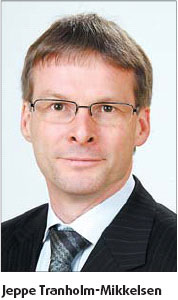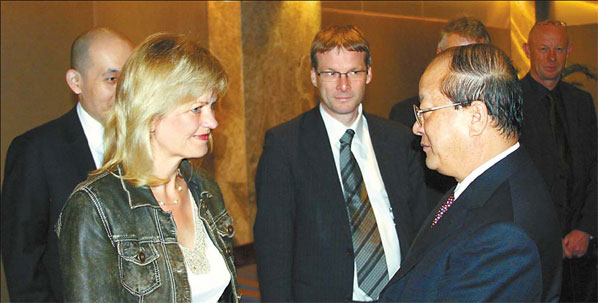Denmark marks Constitution Day
|
Eva Kjer Hansen (left), Minister for Food, Agriculture and Fisheries of Denmark, visited China and met with her Chinese counterpart, Li Changjiang (right), Minister of the General Administration of Quality Supervision, Inspection and Quarantine of China during the 2nd Sino-Danish Conference on Applied Food Safety in April this year in Beijng. |
Surrounded by a green garden shaded by luxuriant walnut trees, the Embassy of Denmark has a stately presence in Beijing's Sanlitun district.
On a bright morning in the library of his residence, Denmark's Ambassador Jeppe Tranholm-Mikkelsen talked with China Daily reporters as Danes prepared to celebrate their Constitution Day on June 5.
The 45-year-old ambassador has accumulated rich diplomatic experience since he began working for the government in 1992. He has served advisor for two prime ministers and was ambassador and deputy permanent representative to the European Union.
Politics and economy
"We have firmly maintained a one China policy and worked continuously to strengthen relations between Denmark and China," Tranholm-Mikkelsen said.
"Since the start of the policy of reform and opening up in 1978, relations have deepened rapidly. Today, bilateral relations between Denmark and China are intensive in wide range of issues and sectors," he said.
"That is also reflected in an attitude of cooperation with China. Danes are generally very open to globalization. Danes see globalization as an opportunity, not as a threat," the ambassador said.
Denmark was among the first Western countries to trade with China and one of the first countries to establish diplomatic relations with the People's Republic of China in 1950.
On May 11, 1950, the governments of Denmark and China issued press statements in Copenhagen and Beijing announcing the establishment of diplomatic relations, which "undoubtedly strengthen the friendship existing between our two peoples", wrote Chairman Mao Zedong in his reply to Minister Alex Morch in the same year.
Communications between the countries date back to 1674 when Danish King Christian V sent an official letter to Chinese Emperor Kangxi of the Qing Dynasty (1644-1910) expressing the wish to establish mutual friendship. Danish merchants then viewed China as a promising market.
Trade and shipping have always been key elements in the relations between Denmark and China, the ambassador noted.
In 1980, a Sino-Danish committee on trade and economic cooperation was established. Now many Danish companies are not only trading with China, but investing in the nation, the ambassador noted.
According to the Ministry of Commerce of China, up to April 2008, Danish investment in China totaled $1.15 billion in 520 projects.

With shipping and commerce their traditional relationship through centuries, Denmark and China are today extending links to include far broader engagement, the ambassador said.
"Today Danish companies cover almost all fields. Looking at the future, we see two areas that are particularly important and in which the Chinese government is very ambitious - first of all, climate, energy and the environment, and also the fields of research, education, innovation and design.
"Many Danish companies have more and more research and development in China and the design of new creations in China," he said. "The government this year launched an action plan for increasing cooperation in research, innovation and technology. The government is actively supporting the development."
"More and more items are not just 'made in China', but 'developed in China' and 'created in China'," the ambassador said.
Culture and sports
This year is the 100th anniversary of a Danish diplomatic presence in China. Exchanges have grown in momentum in recent years through a number of cultural performances and exhibitions in Denmark and China.
Official exchange of students began in 1974 and the number of students of tourists going both ways has increased dramatically during the last few years.
A number of Danish cities have hosted exhibitions of Chinese ceramics, paper cuts, modern art, movies and photography.
Over "Danish Day in China" a host of activities were held to promote understanding, including an exhibition shown in several cities on the life and works of famous Danish writers Hans Christian Andersen and Karen Blixen.
Fittingly Shaoxing in China and Odense in Denmark have formed a sister-city relationship.
"Odense is the proud city of Hans Christian Andersen. Shaoxing is the home city of Chinese contemporary writer Lu Xun, called the father of modern Chinese literature," the ambassador said.
Since 1984, a number of friendship agreements have been signed between cities and regions in Denmark and China in order to promote and strengthen their direct cooperation, he said.
Other friendship ties have been formed between Harbin and Arhus, Hefei and Aalborg, Suzhou and Esbjerg, Tianjin and Kalundborg, Qingdao and Skagen, Shanghai and Aarhus county, Guangdong province and Fyn county, and Wuxi and Bycirklen.
The ambassador said he hopes for Danish Olympic medals in handball, badminton, sailing and perhaps more.
The ambassador added that there is no formal plan by the Danish government to bid for future Olympic Games, but some Danes are keen to do so.
Energy and environment
Cooperation between the two countries on renewable energy and climate change also continues to grow.
"Today bilateral relations are about much more than trade in affordable goods made in China but also about cooperation in such areas as the climate and energy, research and development, design and fashion, education and culture," the ambassador said.
Denmark and China have numerous activities to combat climate change. China's 11th Five-Year Plan (2006-10) aims for renewable energy sources to comprise 15 percent of consumption by 2020.
The ambassador said Denmark is the first country in the world to have a ministry of climate and energy and is a world leader in environmental and energy technology. He sees that as a good basis for strengthening bilateral cooperation in the future.
Denmark also would like to further support China in its endeavor to tackle climate change. This year's "green Olympics" is bringing numerous opportunities for China to cooperate with other countries and regions on energy and the environment.
The ambassador said move is already underway with about 500 buses in Beijing this year using technology supplied by Grundfos NoNOx A/S - an independent division of the Grundfos Group based in Denmark and Guangxi Yuchai Machinery Co Ltd, the largest Chinese manufacturer of engines for heavy-duty diesel vehicles - to reduce emissions of nitrous oxide and carbon dioxide.
"That is a good beginning in the run up to the 2009 global summit in Copenhagen on climate change," the ambassador said. Denmark will host the 15th United Nations Climate Change Conference in Copenhagen in 2009.
Cooperation between China and Denmark on the road to Copenhagen 2009 will be crucial for the conference's success, the ambassador said.
(China Daily 06/05/2008 page17)















